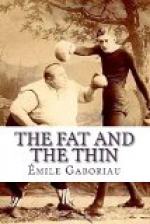In how many dreams he had indulged in that lofty little room, with his eyes wandering over the spreading roofs of the market pavilions! They usually appeared to him like grey seas that spoke to him of far-off countries. On moonless nights they would darken and turn into stagnant lakes of black and pestilential water. But on bright nights they became shimmering fountains of light, the moonbeams streaming over both tiers like water, gliding along the huge plates of zinc, and flowing over the edges of the vast superposed basins. Then frosty weather seemed to turn these roofs into rigid ice, like the Norwegian bays over which skaters skim; while the warm June nights lulled them into deep sleep. One December night, on opening his window, he had seen them white with snow, so lustrously white that they lighted up the coppery sky. Unsullied by a single footstep, they then stretched out like the lonely plains of the Far North, where never a sledge intrudes. Their silence was beautiful, their soft peacefulness suggestive of innocence.
And at each fresh aspect of the ever-changing panorama before him, Florent yielded to dreams which were now sweet, now full of bitter pain. The snow calmed him; the vast sheet of whiteness seemed to him like a veil of purity thrown over the filth of the markets. The bright, clear nights, the shimmering moonbeams, carried him away into the fairy-land of story-books. It was only the dark, black nights, the burning nights of June, when he beheld, as it were, a miasmatic marsh, the stagnant water of a dead and accursed sea, that filled him with gloom and grief; and then ever the same dreadful visions haunted his brain.
The markets were always there. He could never open the window and rest his elbows on the balustrade without having them before him, filling the horizon. He left the pavilions in the evening only to behold their endless roofs as he went to bed. They shut him off from the rest of Paris, ceaselessly intruded their huge bulk upon him, entered into every hour of his life. That night again horrible fancies came to him, fancies aggravated by the vague forebodings of evil which distressed him. The rain of the afternoon had filled the markets with malodorous dampness, and as they wallowed there in the centre of the city, like some drunken man lying, after his last bottle, under the table, they cast all their foul breath into his face. He seemed to see a thick vapour rising up from each pavilion. In the distance the meat and tripe markets reeked with the sickening steam of blood; nearer in, the vegetable and fruit pavilions diffused the odour of pungent cabbages, rotten apples, and decaying leaves; the butter and cheese exhaled a poisonous stench; from the fish market came a sharp, fresh gust; while from the ventilator in the tower of the poultry pavilion just below him, he could see a warm steam issuing, a fetid current rising in coils like the sooty smoke from a factory chimney. And all these exhalations coalesced above the roofs, drifted towards the neighbouring houses, and spread themselves out in a heavy cloud which stretched over the whole of Paris. It was as though the markets were bursting within their tight belt of iron, were beating the slumber of the gorged city with the stertorous fumes of their midnight indigestion.




